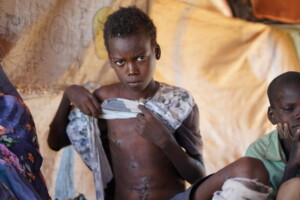UN WFP operations in Darfur ‘partially resumed’
The United Nations World Food Programme (WFP) has partially resumed operations in North Darfur after more than a month’s suspension following a series of attacks and looting of all three of its warehouses in El Fasher in December 2021. Nutrition programmes for malnourished children and pregnant and nursing mothers as well as school meals programmes have now resumed in the region with WFP aiming to reach 122,600 people with nutrition support and 321,000 school children with school meals this year.
 World Food Programme staff load bags of food into lorries at a WFP warehouse based in El Fasher, North Darfur (File photo: Albert González Farran / Unamid)
World Food Programme staff load bags of food into lorries at a WFP warehouse based in El Fasher, North Darfur (File photo: Albert González Farran / Unamid)
The United Nations World Food Programme (WFP) has partially resumed operations in North Darfur after more than a month’s suspension following a series of attacks and looting of all three of its warehouses in El Fasher in December 2021. Nutrition programmes for malnourished children and pregnant and nursing mothers as well as school meals programmes have now resumed in the region with WFP aiming to reach 122,600 people with nutrition support and 321,000 school children with school meals this year.
“WFP’s priority is ensuring the hungriest children have food on their plates and people suffering malnutrition get the treatment they need,” said Eddie Rowe, WFP Representative and Country Director in Sudan. “We hope that security conditions will allow us to continue our work and we urge all parties to continue to provide safe access for humanitarian workers and protect humanitarian assets and supplies, so that we can reach people who are in need of assistance.”
The WFP suspended operations across North Darfur in Sudan in late December 2021, following the looting of three of its warehouses in the state capital El Fasher. WFP Executive Director David Beasley expressed “outrage at the senseless attacks”. The WFP said at the time that the suspension could affect close to two million people in the area in 2022.
A WFP statement on Tuesday explains that “as we face a year of unprecedented needs globally, assurances of safe access as well as increased resourcing is vital to save lives in Sudan. WFP is gradually resuming general food assistance to around 362,000 refugees and internally displaced persons (IDPs) using cash-based transfers, however a major funding shortfall of US$285 million for the next six months (March-August 2022) is jeopardising operations and lives,” WFP says.
Limited resources have been prioritised to ensure that the needs of the most vulnerable people in Sudan are met but, even with this prioritization exercise, food stocks and cash are expected to run out starting April across the country. Without new funds, WFP may have no choice but to make further cuts and the impact could be devastating.

Hunger among Darfur displaced
Displaced people in Darfur reveal signs of hunger and a great shortage of food, warning of catastrophic effects in the absence of appropriate aid.
Haroun from the Hasaheisa camp in Zalingei, Central Darfur, told Radio Dabanga that a large number of displaced people only eat one meal per day, pointing to the scarcity of food with outrageous high prices.
He described the agricultural season of last year as a failure, explaining that farmers were unable to harvest three-quarters of the crops after their farms were damaged by the introduction of livestock into agricultural lands. The instability of the security at the beginning of the rainy season played a major role in the failure of agriculture.
He said that the classification of the displaced into several categories by the United Nations, based on false information and incorrect criteria, has deprived a large number of beneficiaries of food aid. He warned that the lack of food will cause an increase in thefts and crimes. He called on the international community to expedite the provision of food aid to the displaced.











 and then
and then